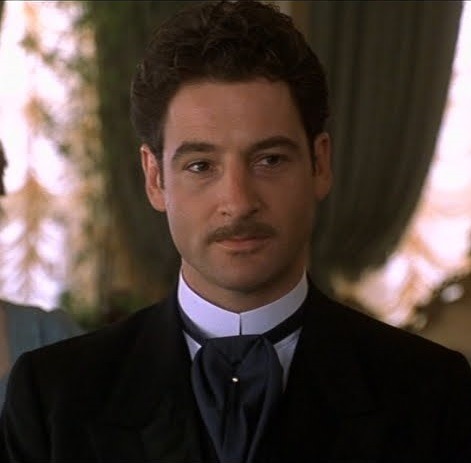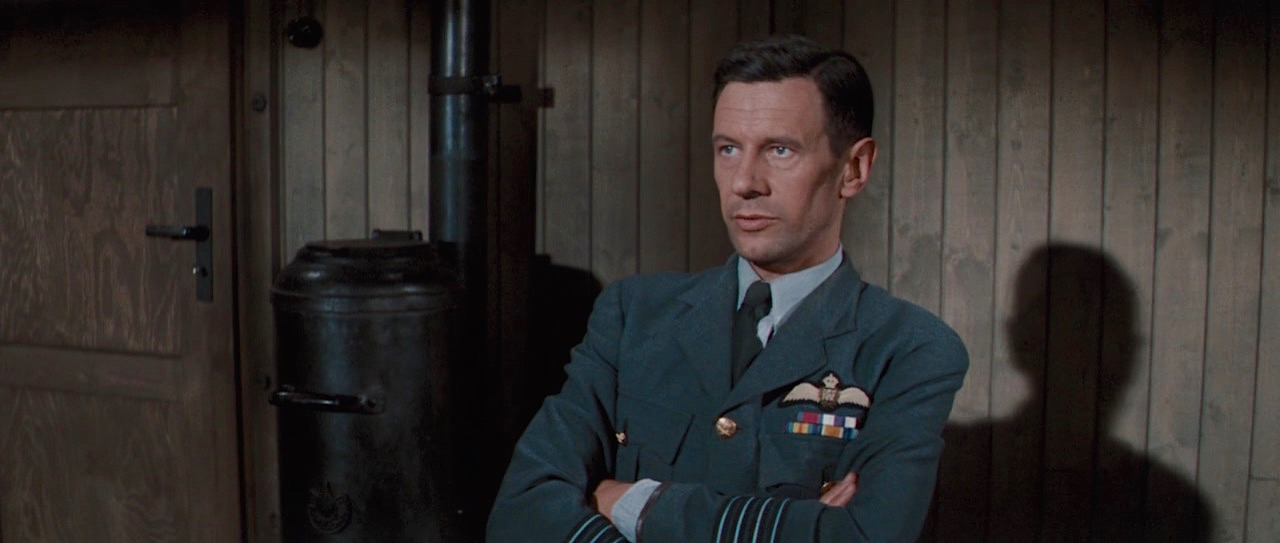
![]()
AN IDEAL HUSBAND (1999)
I suppose there are those who dislike the works of Oscar Wilde, but I am not one of them. He was high society (I am not), he was homosexual (I am not), he was a vain man (I hope I am not), and he was possessed of a super intellect, (sadly, I am not that fortunate). Indeed, the only thing I share with him is his profound appreciation of the English language. Most of his one-line ‘truths’ tend to hit the mark one way or another, albeit in an upper-crust, often snide, way. His Broadway play titled An Ideal Husband first opened at the Lyceum Theatre in 1895 and ran for forty performances. It was first filmed in 1935.
In 1947 it was made into a feature film starring Paulette Goddard, Michael Wilding, Diana Wynyard, Hugh Williams and Glynis Johns. Although it was one of the most popular pictures released in Britain in 1948, it did not fare well in other markets. I have not seen it myself so I cannot offer an assessment here, but I have watched the 1999 version several times and enjoyed it every time. This more recent (1999) version was made on a $14 million budget. It at least covered expenses, grossing about eighteen and a half million, all of which was accumulated in Canada and the USA.
This version features a wonderful cast, headed by Julianne Moore as the scheming Mrs. Cheveley, Rupert Everett as Lord Goring, Jeremy Northam as Sir Robert Chiltern, Cate Blanchett as his wife Gertrude, and Minnie Driver as Mabel. Everett as Lord Goring is blessed with most of Wilde’s best lines and pretty much steals the film. As usual with Wilde’s plays, the story merely serves as a framework for his observations on society and life in general. But who cares? Certainly not this writer. I have always preferred Wilde to Shakespeare; clear evidence of my lack of intellect, I hasten to add. Hopefully, such an admission might save me from being accused of this by all and sundry. I wholeheartedly admit to a preference for being entertained on the screen, and Oscar usually fills that need with most of his works. Appreciating Bill the Bard requires a lot more work on my part if I am to have any hope of unravelling his obscure phrasing. Oscar, I readily confess, is so much easier to grasp for my limited intellect.
Without revealing the tale’s plot in its intricacy, I shall simply say that Mrs. Cheveley is a blackmailer bent on making money from a fraudulent scheme that Sir Robert Chiltern is pledged to expose. He must either support the scheme in parliament, or expect the lady to make public her knowledge of the origins of his wealth, thereby ruining both his reputation and his marriage in the process. Goring (as Sir Robert’s closest friend) becomes involved in the subsequent subterfuge and also provides a romantic subplot – (will he remain a confirmed bachelor, or will he fall for one of the ladies?) And, if so, which one? In effect, his character provides an outlet for Wilde’s more outrageous proclamations regarding society, love and marriage. Everett seems born to play Lord Goring and handles the role with aplomb.
Rupert Everett as Arthur, Lord Goring
(One-line gems from Arthur, Lord Goring):
‘Fashion is what one wears oneself. What is unfashionable is what other people wear. Other people are quite dreadful. The only possible society is oneself.’
‘There’s nothing I like more than to be congratulated, though invariably I find the pleasure increased when I know what for.’
‘I love talking about nothing, father. It’s the only thing I know anything about.’
‘My dear father, when one pays a visit, it is for the purpose of wasting other people’s time and not one’s own.’
‘To love oneself is the beginning of a lifelong romance.’
‘I always pass on good advice. It is the only sensible thing to do with it.’
Lord Goring (Everett): ‘…the fact is, father, this is not my day for talking seriously.’
His father, Lord Caversham (John Wood): ‘What do you mean, sir?’
Lord Goring: ‘I mean that, during the season, father, I only talk seriously on the first Tuesday in every month – between noon and three.’

Julianne Moore as Mrs. Cheveley
Mrs. Cheveley (Julianne Moore): ‘Wonderful woman, Lady Markby, isn’t she? Talks more and says less than anybody I ever met.’

Jeremy Northam as Sir Robert Chiltern
Sir Robert Chiltern (Jeremy Northam): ‘If you are suggesting, Sir Edward, that my position in society owes anything to my wife, you are utterly mistaken. It owes everything to my wife.’
Sir Robert: ‘You could always get married.’
Lord Goring: ‘It’s the ‘always’ bit that alarms me.’
Sir Robert: ‘Anyway, what’s that saying about the sea and there being plenty of fish in it?’
Lord Goring: ‘Ah, yes, but I couldn’t possibly marry a fish. I’d be sure to land an old trout.’

THE GREAT ESCAPE (1963)
During World War Two the German High Command decided to place all its troublesome POWs in the one camp, Stalag Luft III, located in Poland, a facility the Germans believed to be ‘escape proof’. It wasn’t. When the most notorious escapers were all sent to this one camp, they immediately pooled their knowledge and expertise on escaping and made plans for an escape that would possibly involve hundreds of prisoners. Based (loosely) on a true story, The Great Escape tells of the breakout and of the extreme actions taken by the German High Command upon many of those recaptured.
The picture boasts a star-studded cast that includes Steve McQueen, James Garner, Charles Bronson, Richard Attenborough, James Coburn, James Donald, Donald Pleasance, David McCallum, John Leyton, Gordon Jackson and Hannes Messemer. The film was directed by John Sturges, the same man who helmed the 1960 classic The Magnificent Seven. In fact three of the ‘seven’, McQueen, Bronson and Coburn were cast here as well.

Richard Attenborough as Squadron Leader Bartlett
Bartlett (Attenborough): ‘It’s possible for one man to get out through the wire, even get away, but there are in fact a considerable number of people besides yourself in this camp who are trying to escape.’

Steve McQueen as Hilts
Hilts (McQueen): ‘I appreciate that. Something’s coming. I can feel it, and it’s coming right around the corner at me, Squadron Leader. Wait a minute. You aren’t seriously suggesting that if I get through the wire…and case everything out there…and don’t get picked up…to turn myself in and get thrown back in the ‘cooler’ for a couple of months so you can get the information you need?’
Bartlett: ‘Yes. One has to ask some very strange things in the job I have.’
Ashley-Pitt (McCallum), watching Hilts being brought back into camp: ‘I didn’t think he’d get caught so soon.’
Bartlett: ‘He wasn’t caught.’
Hilts: ‘How many you taking out?’
Bartlett: ‘Two hundred and fifty.’
Hilts: ‘Two hundred and fifty?
Bartlett: ‘Yeh’.
Hilts: ‘You’re crazy. You oughta be locked up. You, too. Two hundred and fifty guys just walkin’ down the road, just like that?’

Colonel Ramsey (James Donald) is told of the murder of 50 escapers
Von Luger (Hans Messemer): ‘Eleven of your men are being returned today.’
Colonel Ramsey (Donald): ‘Oh? Who?’
Von Luger: ‘I do not have that information. I…I am directed by higher authority to inform you that…fifty of your officers were shot while escaping.’
Ramsey: ‘Shot?’
Von Luger: ‘Their…their personal effects will be returned.’
Ramsey: ‘How many of them were wounded?’
Von Luger: ‘Here are the names…of the dead.’
Ramsey: ‘How many of the fifty were wounded?’
Von Luger: ‘None. The…the higher authority only directs me to inform you that fifty men were…’
Ramsey: ‘I see.’

As a teenager, the coolest and most athletic thing I had ever seen in a movie was Steve McQueen’s flying drop kick of a Nazi guard as he shot a poor prisoner who had snapped and was trying to climb over the barbed wire to escape. I think it was that action that made McQueen’s character buy into the whole escape plan. A truly great moment of filmmaking in my youthful opinion. It’s still my opinion sixty years later.